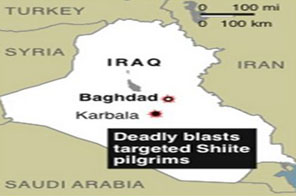20 killed in Iraq blast
BAGHDAD: A bomb planted on a parked motorcycle exploded Wednesday on the outskirts of the holy city of Karbala, killing at least 20 Shiite pilgrims and wounding more than 100 others amid tight security for the huge religious procession, officials said.
The blast was the latest in a string of attacks this week that have targeted pilgrims making their way to an important Shiite religious observance in Karbala, raising fears of a spike in attacks by suspected Sunni insurgents when the pilgrimage culminates Friday.
The bomb exploded at about 11 a.m. in an area known as Ibrahimia, near the east entrance — one of three — into Karbala, about 50 miles (80 kilometers) south of Baghdad, said the official, who spoke on condition of anonymity because he was not authorized to brief media.
At least 108 people were wounded in the attack, the official said, adding that the area was clogged with pilgrims and the number of casualties could increase. A hospital official in Karbala, also speaking on condition of anonymity, confirmed the number of dead and wounded.
Hours earlier, two separate roadside bombs targeting Shiite pilgrims exploded in Baghdad, killing one and wounding seven others, a security official in the capital said.
The official said the first attack took place Wednesday at about 6:15 a.m. in western Baghdad, killing one person and wounding three. He said a second explosion in southwest Baghdad wounded four pilgrims.
The official spoke on condition of anonymity because he was not authorized to release the information.
For years, the main Shiite pilgrimages have been a prime target for attacks blamed on Sunni extremists seeking to widen sectarian rifts. The current processions have brought hundreds of thousands of people streaming toward Karbala to end the 40-day mourning period marking the death of Hussein, a revered Shiite figure from the 7th century.
The religious events also come about a month before critical parliamentary elections on March 7, which are seen as a test of reconciliation between majority Shiites and minority Sunnis who dominated Iraq until Saddam Hussein's ouster in 2003.
On Monday, a woman suicide bomber north of Baghdad killed 54 Shiite pilgrims, including a dozen children. After the attack, authorities promised to intensify security along the pilgrimage route.
Karbala police spokesman, Maj. Alaa Abbas, said more than 30,000 security personnel were deployed around the city. The measures included bomb-sniffing dogs at the three main entrances to Karbala and undercover intelligence agents in the crowds.
But tight security in the past has failed to prevent bloodshed among Shiite pilgrims or at shrines.
During a Shiite pilgrimage in February 2009, a female suicide bomber attacked a tent filled with women and children resting during the walk to Karbala, killing 40 people and wounding 60 others. A month before that, a suicide bomber dressed in women's clothing and hiding among Iranian pilgrims killed more than three dozen people outside a mosque in Baghdad's Shiite neighborhood of Kazimiyah.
Earlier Wednesday, a senior security official said agents arrested 13 suspects believed involved in making explosive belts for suicide attacks.
The official said authorities believe the belts — including five seized by police — were intended for attacks on Shiite pilgrims. The official spoke on condition of anonymity because he was not allowed to give the information to media.






